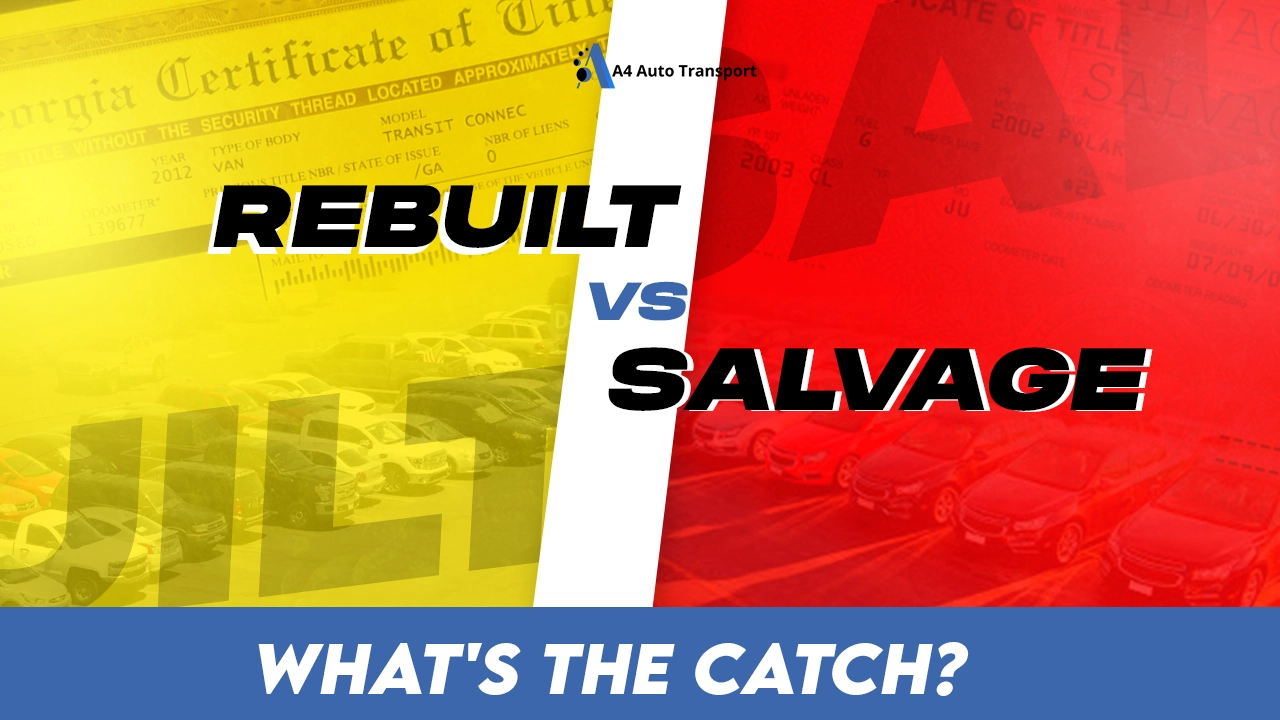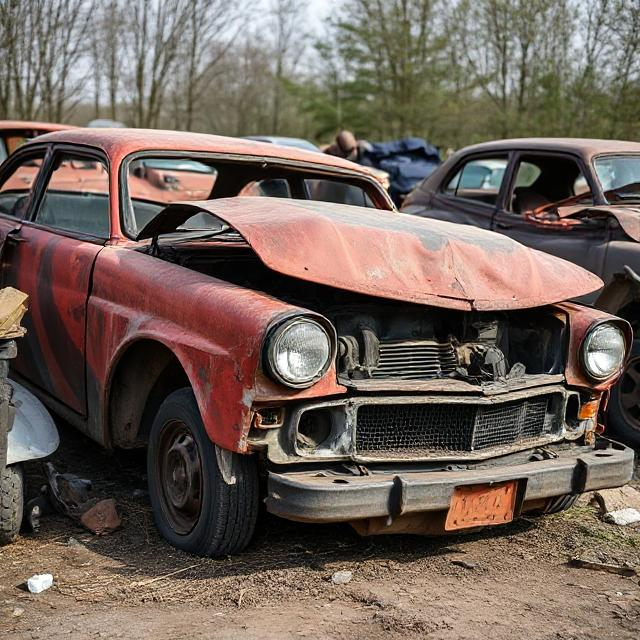Rebuilt Title vs. Salvage Title: The Key Differences You Should Know in 2026

Shopping for a used car on a tight budget? You’ll run into salvage and rebuilt titles. Here’s the bottom line: a salvage title means the car is totaled and can’t be driven. A rebuilt title means it was totaled, then fixed and passed inspection.
Both save you money upfront. Both come with serious trade-offs. This guide breaks down everything you need to know to make a smart decision.
Is a Rebuilt Title the Same as a Salvage Title?
No, a rebuilt title is not the same as a salvage title. They are different types of car titles used in vehicle registration and insurance records.
What’s the Difference Between Rebuilt and Salvage Title?
A salvage title is issued when a car has been deemed a total loss by an insurance company and is considered unsafe to drive. A rebuilt title, however, is given to a formerly salvaged vehicle that has been repaired, passed state inspections, and deemed roadworthy again.
The main difference is that salvage cars cannot legally be driven, while rebuilt cars can, though both may have lower resale value and higher insurance costs.
What Exactly Is a Salvage Title?

A salvage title is issued when an insurance company declares a vehicle a total loss. In most states, this happens when repair costs exceed 70-90% of the vehicle’s actual cash value.
Common reasons a car gets a salvage title:
- Severe collision damage with structural compromise
- Flood damage from hurricanes or natural disasters
- Fire damage affecting the engine or frame
- Theft recovery with significant damage or missing parts
Once declared salvage, the car:
- Cannot be legally driven on public roads
- Cannot be registered with the DMV
- Cannot be insured for regular use
- Must be repaired before getting a rebuilt title
Where salvage cars end up: Most salvage vehicles are sold at auctions like Insurance Auto Auction (IAAI) or Copart, or through online car auction sites. Buyers are typically mechanics, hobbyists looking for project cars, or parts dealers.
Real example: A 2019 Honda Accord worth $22,000 gets rear-ended. Insurance estimates $18,000 in repairs (82% of value). Result? Salvage title.
What Does a Rebuilt Title Mean?
A rebuilt title (sometimes called “reconditioned” or “reconstructed”) is issued to a vehicle that was previously salvaged but has been:
- Professionally repaired
- Inspected by state-certified inspectors
- Approved as safe and roadworthy
The inspection process typically checks:
- Frame and structural integrity
- Safety systems (airbags, brakes, seatbelts)
- Emissions compliance
- All major mechanical systems
- Proper documentation of repairs
Once approved, the salvage title is cleared and replaced with a rebuilt title. The vehicle can now be registered, insured, and driven legally.
Important: A rebuilt title is permanent. The car can never return to clean title status, even with flawless operation.
Rebuilt vs Salvage Title: Key Differences at a Glance
| Feature | Salvage Title | Rebuilt Title |
|---|---|---|
| Legal to Drive? | No – unsafe and not roadworthy | Yes – passed inspection, legal to drive |
| Current Condition | Damaged, needs major repairs | Repaired, inspected, ready to drive |
| Registration | Cannot be registered for road use | Can be registered normally |
| Insurance Coverage | Not available for driving | Limited – usually liability only |
| Typical Purchase Price | 50–70% below clean title value | 20–40% below clean title value |
| Financing Options | Not available | Very limited, higher rates |
| Resale Value | Very low – parts value only | Moderate but still significantly reduced |
| Buyer Type | Mechanics, parts dealers, hobbyists | Budget buyers, daily drivers |
| Inspection Required | None (already declared total loss) | Yes – state-mandated safety inspection |
| Where to Buy | Auctions (Copart, IAAI) | Dealerships, private sellers, online |
| Risk Level | Extremely high – unknown damage | Moderate – depends on repair quality |
| Can It Become a Clean Title? | No – permanent designation | No – permanent designation |
What Is the Value of a Salvage Title?
Salvage cars sell for 50-70% less than clean titles because they need repairs, can’t be driven, and carry high risk.
Example: A $20,000 clean title Toyota Camry might sell for $6,000-10,000 with salvage title.
What Is the Value of a Rebuilt Title?
Rebuilt cars lose 20-40% of value even after repairs.
Real numbers:
- Clean title 2021 Mazda3: $19,000
- Same car rebuilt: $11,400-15,200
- Loss: $3,800-7,600
Value by damage type:
- Minor collision: 20-25% reduction
- Major collision: 30-40% reduction
- Flood damage: 35-45% reduction
- Fire damage: 40-50% reduction
How Do State Regulations Differ?
State regulations for rebuilt and salvage vehicles can vary widely. Most states declare a vehicle salvage when repair costs reach 70–75% of its value, though some states set the threshold anywhere from 60–80%.
Inspection requirements also differ depending on the state. Strict states like Florida, New York, and Texas require multiple inspections, submission of before and after photos, and all repair receipts to ensure the car is roadworthy.
Moderate states may require only a single inspection, basic documentation, and a visual safety check, while lenient states often ask for minimal paperwork and sometimes no physical inspection at all.
As a general rule, vehicles rebuilt under stricter inspection rules are typically safer and more reliable. Always check your state DMV or motor vehicle office for the exact regulations before buying or registering a rebuilt or salvage-titled vehicle.
Can You Insure a Rebuilt Title or Salvage Title Car?
Yes, you can insure a rebuilt or salvage title car, but coverage options are often limited compared to a clean-title vehicle. Most insurance companies will offer liability coverage, which protects others if you’re at fault in an accident. Some companies may provide comprehensive or collision coverage, but usually at higher premiums, reflecting the higher risk associated with a previously damaged vehicle.
Example: If you buy a rebuilt car from CarGurus that was once totaled in a minor accident but fully repaired and inspected, your insurer might allow full coverage after reviewing the repair receipts and inspection reports. However, some companies, like State Farm or Geico, might limit coverage or require a detailed inspection, because the car’s past damage could increase the likelihood of future mechanical issues.
Can You Finance a Rebuilt Title or Salvage Title Car?
Financing a rebuilt or salvage title car is more challenging than financing a clean-title vehicle, because banks and traditional auto lenders consider them high-risk assets due to lower resale value and potential hidden damage. Many lenders may refuse loans entirely, or approve them with higher interest rates and larger down payments.
Are Cars with Rebuilt Titles Safer to Buy as Compared to Salvage Titles?
If you have to choose between a rebuilt title and a salvage title, a rebuilt title car is generally the safer option, but it’s still not as safe or reliable as a clean-title vehicle. Rebuilt cars have been repaired, inspected, and deemed roadworthy, making them legal to drive and easier to insure. Salvage title cars, however, are still considered severely damaged, harder to insure, and difficult to finance.
Choose a rebuilt title car if:
- You want a driveable car at a lower cost.
- Repairs are well-documented and the car passed a state inspection.
- You can handle insurance limitations and plan to keep the car long-term.
Always remember: Even rebuilt cars may have hidden issues or reduced structural integrity, so if safety is your top priority, a clean-title vehicle is the best choice. Salvage title cars should only be considered by experienced buyers or mechanics who are prepared for major repairs and inspections.
Key takeaway: Rebuilt title cars can be a practical budget option, but they’re not fully risk-free. Clean-title vehicles remain the safest and most reliable choice for most buyers.
Advantages of Rebuilt Title Over Salvage Title
- Legal to drive – Passed inspection, can register immediately
- Insurable – At least liability coverage available
- Higher value – Worth more than salvage
- Verified safe – State confirmed minimum safety standards
- Documented repairs – Know what was fixed
- Financing possible – Some lenders will approve
Disadvantages of a Rebuilt Title Compared to a Clean Title
- Lower resale value – Rebuilt cars are worth significantly less than clean-title vehicles.
- Potential hidden damage – Even after repairs, some structural or mechanical issues may remain.
- Insurance limitations – Full coverage may be denied or cost more; some insurers offer only liability.
- Financing challenges – Many banks and lenders may refuse loans or require higher interest and down payments.
- Perceived risk – Buyers may be hesitant, making resale harder in the future.
- Safety concerns – Rebuilt vehicles may meet minimum state safety standards, but they’re generally not as safe as clean-title cars in severe accidents.
Key takeaway: While rebuilt title cars are legal and often functional, they cannot match the reliability, resale value, and peace of mind of a clean-title vehicle.
Where Can You Find Rebuilt Title Cars?
- Online: Used-car websites, Facebook Marketplace, Craigslist, eBay Motors (check descriptions carefully)
- Dealerships: Some specialize in rebuilt titles, must legally disclose status
- Private sellers: Often mechanics who rebuild cars, get full documentation
- Auctions: Copart and IAAI sell both salvage and rebuilt (factor in transport costs)
Conclusion
Understanding the difference between rebuilt and salvage title is essential when shopping for a used car. While salvage title vehicles are damaged and not yet roadworthy, rebuilt title cars have been repaired, inspected, and approved for legal driving. Although rebuilt titles offer a safer option than salvage titles, neither compares fully to the peace of mind and value of a clean title vehicle. Always do your due diligence before making a purchase.
Frequently Asked Questions
Is a rebuilt title the same as a salvage title?
Can I turn a rebuilt title back to a clean title?
How much does a rebuilt title affect resale value?
What percentage of damage triggers a salvage title?
Can I get full coverage insurance on a rebuilt title?
Will my bank finance a rebuilt title car?
Are flood-damaged rebuilt titles safe?
How long does a rebuilt title inspection take?
Can I sell a rebuilt title car to a dealer?

a4AutoTransport is a group of auto transport researchers and experts that comes in handy for anyone who wants to move their car/vehicle without putting extra miles on the odometer. At a4AutoTransport, We researched over a hundred car shipping companies, interviewed real customers and industry leaders, and collected nearly 500 quotes to find the nation’s best auto transport companies. With our combined 5 years of industry experience and research, we’ll help you find the right car shipper for your budget.
